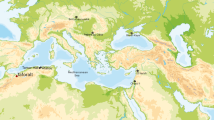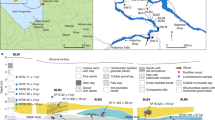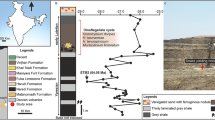Abstract
THE results obtained by Diggle and Saxon1 on a Homosteus plate from Clardon Haven, Thurso, do not, as they suggest, differ in any significant way from those published previously by Atkin and myself2. We showed that “whereas both uranium and thorium form organic complexes or compounds with hydrocarbon, only uranium is fixed by bone apatite”. This means that a radioactive fish plate without much associated hydrocarbon would have a higher ratio of uranium : thorium than one with abundant hydrocarbon. Thus if the plate studied by Diggle and Saxon was mainly composed of bone apatite the bulk of the radioactivity would be attributable to uranium.
This is a preview of subscription content, access via your institution
Access options
Subscribe to this journal
Receive 51 print issues and online access
$199.00 per year
only $3.90 per issue
Buy this article
- Purchase on Springer Link
- Instant access to full article PDF
Prices may be subject to local taxes which are calculated during checkout
Similar content being viewed by others
References
Diggle, W. R., and Saxon, J., Nature, 208, 400 (1965).
Bowie, S. H. U., and Atkin, D., Nature, 177, 487 (1956).
Author information
Authors and Affiliations
Rights and permissions
About this article
Cite this article
BOWIE, S. An Unusually Radioactive Fossil Fish from Thurso, Scotland. Nature 211, 728–729 (1966). https://doi.org/10.1038/211728b0
Issue Date:
DOI: https://doi.org/10.1038/211728b0
Comments
By submitting a comment you agree to abide by our Terms and Community Guidelines. If you find something abusive or that does not comply with our terms or guidelines please flag it as inappropriate.



